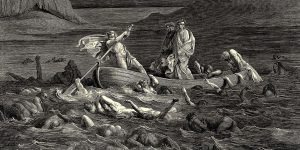“Cimourdain was a pure-minded but gloomy man. He had ‘the absolute’ within him. He had been a priest, which is a solemn thing. Man may have, like the sky, a dark and impenetrable serenity; that something should have caused night to fall in his soul is all that is required. Priesthood had been the cause of night within Cimourdain. Once a priest, always a priest. Whatever causes night in our souls may leave stars. Cimourdain was full of virtues and truth, but they shine out of a dark background.” ―Victor Hugo, Quatrevingt-Treize
I was walking with an atheist friend when he said, “Did you hear about the coup in Turkey? Both sides thought they were in the right, and called the other evil.”
It is inherent in human nature to strive toward a good, or at least a perceived good. The chain smoker or alcoholic seeks the good of relief from whatever stress they’re undergoing; the man who commits suicide seeks relief from what he perceives as insurmountable pain.
Idealism untempered by prudence and charity is often the cause of massive suffering. Look at China, shorn of its magnificent, beautiful, ancient culture by the Cultural Revolution, with intellectuals and artists tortured to death by frenzied, manipulated youth, not to mention 45 million dying of famine in the Great Leap Forward. Look at France, with 40,000 killed in the French Revolution. All human attempts to create a perfect society on earth will fail, for we are frail beings with many faults. Even religious communities are not perfect—all of them except the Carthusians have had to undergo reform in order to return to their ascetical roots.
 It is said that Napoleon declared, “Je détruirai votre église”—“I will destroy your Church.” Cardinal Consalvi replied drily, “He will never succeed. We have not managed to do it ourselves.” Fr. Roger Landry explains: “If bad popes, immoral priests, and countless sinners in the Church hadn’t succeeded in destroying the Church from within, Cardinal Consalvi was saying, how did Napoleon think he was going to do it from without?” (Catholic Answers: “A Crisis of Saints”).
It is said that Napoleon declared, “Je détruirai votre église”—“I will destroy your Church.” Cardinal Consalvi replied drily, “He will never succeed. We have not managed to do it ourselves.” Fr. Roger Landry explains: “If bad popes, immoral priests, and countless sinners in the Church hadn’t succeeded in destroying the Church from within, Cardinal Consalvi was saying, how did Napoleon think he was going to do it from without?” (Catholic Answers: “A Crisis of Saints”).
The worst suffering in my life came not from my family’s multiple brushes with death, but from living in a Catholic community formed by idealists who had made woefully insufficient provision for addressing the mental-health issues of its members. A few friends and I carried the weight of our suffering fellows, and it crushed us. The reality is, we live in a broken world, suffering the effects of original sin. And that is why we need a Savior, a Divine Physician Who can bind our suppurating wounds and restore us to eternal life.
It is not enough to pray. Jesus always prayed, yes, but then He acted. God has granted us reason and free will to govern our emotions and appetites. He has also permitted us to develop modern medicine (thanks in great part to countless Catholic scientists, physicians, and nurses through the ages). He has permitted us to make laws and lay down regulations to govern our earthly lives for a just and flourishing society. Medicine and law are imperfect and can be twisted to evil ends, but that is the nature of the moral life, to be able to discern both intentions and ends and act according to the law written on our hearts, the natural law that God has planted in every human soul so that we may seek out what is good in accordance with our nature—which is ultimately God, the source and end of our existence.
It is often difficult to discern the right path, as our intellects have been darkened after the Fall. We are unable to see all the consequences that may flow from our actions, no matter how well-intentioned. We are obliged to form our consciences (CCC 1798) and avail ourselves of God’s grace in every circumstance. The world is a dark place, yes—but God has entered our darkness to give us Light.
In the end, even if we go through a seemingly pointless hell, the wonderful thing is that God has entered hell to bring us to Heaven, and He is in that hell with us. Like straw spun into gold, so may our horrible sufferings be turned into the radiant glory of salvation.
“The evil that is in the world almost always comes from ignorance, and good intentions may do as much harm as malevolence if they lack understanding.” —Albert Camus
“Hell is full of good meanings, but Heaven is full of good works.” —Traditional proverb
—
Image: Gustave Doré, illustration of Dante’s Inferno / PD-US





